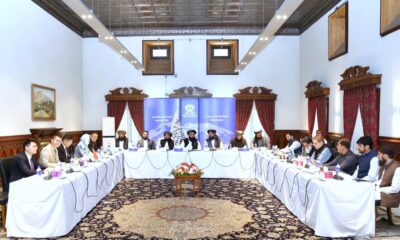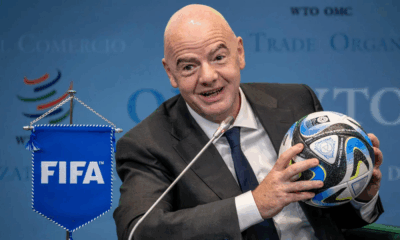World
World wastes 19 percent of foods: UN report

According to a United Nations report, the world wasted an estimated 1,05 billion metric tons or 19 percent of the food available to consumers worldwide in 2022.
According to the report, this wastage occurs when 783 million people in the world go hungry, and a third of humanity faces food insecurity.
The data on food wastage worldwide was released by the United Nations in the 3rd Food Waste Index Report 2024 prepared by the United Nations Environment Programs published on 27 March 2024.
The Food Waste Index Report is an effort of the United Nations to raise awareness about food wastage and achieve Sustainable Development Goal (SDG) 12.3, which aims to halve world food waste by 2030.
The United Nations Environment Program (UNEP) released the first Food Waste Index Report in 2011.
Main Highlights of the 3rd Food Waste Index Report 2024
In 2022, 1.05 billion tons of food, or 19 percent of food available to consumers, was wasted at the retail, food service, and household level. This was in addition to the 13% loss estimated by the Food and Agriculture Organization during the post-harvest supply chain.
Households were the major source of food wastage. Out of the total food wastage, households were responsible for 631 million tons, equivalent to 60 percent, the food service sector for 290 and the retail sector for 131.
The annual per capita food wastage in the world is 79 kg and around one billion meals per day are wasted by households.
The greenhouse gases generated by food loss and waste are estimated to be 8-10 per cent of world greenhouse gas emissions. They are almost five times the total emissions generated by the aviation sector.
The countries in the hotter regions have more food waste per capita in household sectors. According to the report, this could be due to a lack of cold chains and an increase in the consumption of fresh foods with substantial inedible parts. The prevalence of higher seasonal temperatures, extreme heat events, and droughts creates problems in storage, processing, and transportation, leading to significant food waste.
Urban-Rural Disparities: In Middle-income countries, rural populations waste less food than urban areas. The report says this could be due to the greater diversion of leftover foods to pets, use as animal feed, and home composting in rural areas.
The report recommends that Countries use the Food Waste Index to measure food waste consistently, develop robust national baselines, and track progress to meet the SDG 12.3 goal.
As of 2022, only 21 countries, including Cabo Verde, China, Namibia, Sierra Leone, and the United Arab Emirates, have included food loss and/or waste reduction in their national climate plans (NDCs).
The United Nations Environment Program (UNEP) was established in 1972. The decision to establish the Program was taken at the United Nations Conference on Human Environment held in Stockholm, Sweden, in 1972.
In 1988, the UNEP set up the Intergovernmental Panel on Climate Change (IPCC) with the World Meteorological Organization to provide policymakers with regular scientific assessments on global warming and climate change.
The UNEP helps its member countries achieve triple environmental objectives, to foster climate stability, live in harmony with nature and forge a pollution-free future, supporting the achievement of all 17 SDGs.
World
Trump says India, Pakistan agree to ‘full and immediate ceasefire’

U.S. President Donald Trump said on Saturday that India and Pakistan had agreed to a “full and immediate ceasefire” after a fourth day of strikes and counter-strikes against each other’s military installations.
Pakistan’s foreign minister also said both countries had agreed to a ceasefire “with immediate effect” and India’s foreign ministry said it would start at 5 p.m. Indian time (1130 GMT).
“After a long night of talks mediated by the United States, I am pleased to announce that India and Pakistan have agreed to a FULL AND IMMEDIATE CEASEFIRE. Congratulations to both Countries on using Common Sense and Great Intelligence,” Trump said in a post on Truth Social.
The sudden announcement came on a day when fears spiked that the countries’ nuclear arsenals might come into play as Pakistan’s military said a top military and civilian body overseeing its nuclear weapons would meet.
But Pakistan’s defence minister later said no such meeting was scheduled.
At the same time, officials from both sides showed a willingness to take a step back following the day’s exchanges, as the combined civilian death toll on the two sides rose to 66.
“Pakistan and India have agreed to a ceasefire with immediate effect,” Pakistani Foreign minister Ishaq Dar posted on X. “Pakistan has always strived for peace and security in the region, without compromising on its sovereignty and territorial integrity!”
India’s foreign ministry said that the head of Pakistan’s military operations called his Indian counterpart on Saturday afternoon and it was agreed that both sides would stop all firing.
The two heads will speak to each other again on May 12, the ministry added.
The fighting began on Wednesday when India carried out strikes on what it said was “terrorist infrastructure” in Pakistani Kashmir and Pakistan, two weeks after 26 people were killed in an attack on Hindu tourists in Indian Kashmir.
Pakistan denied India’s accusations that it was involved in the tourist attack. Since Wednesday, the two countries have exchanged cross-border fire and shelling, and sent drones and missiles into each other’s airspace.
The countries have been locked in a dispute over Kashmir since they were born after the end of British colonial rule in 1947. Hindu-majority India and Islamic Pakistan both claim Kashmir in full but rule it in part.
They have gone to war three times since, including twice over Kashmir, and clashed several times.
India blames Pakistan for an insurgency in its part of Kashmir that began in 1989 and has killed tens of thousands. It also blames Pakistani Islamist militant groups for attacks elsewhere in India.
Pakistan rejects both charges. It says it only provides moral, political and diplomatic support to Kashmiri separatists.
(Reuters)
World
US offers to help India and Pakistan start talks, G7 also urges dialogue
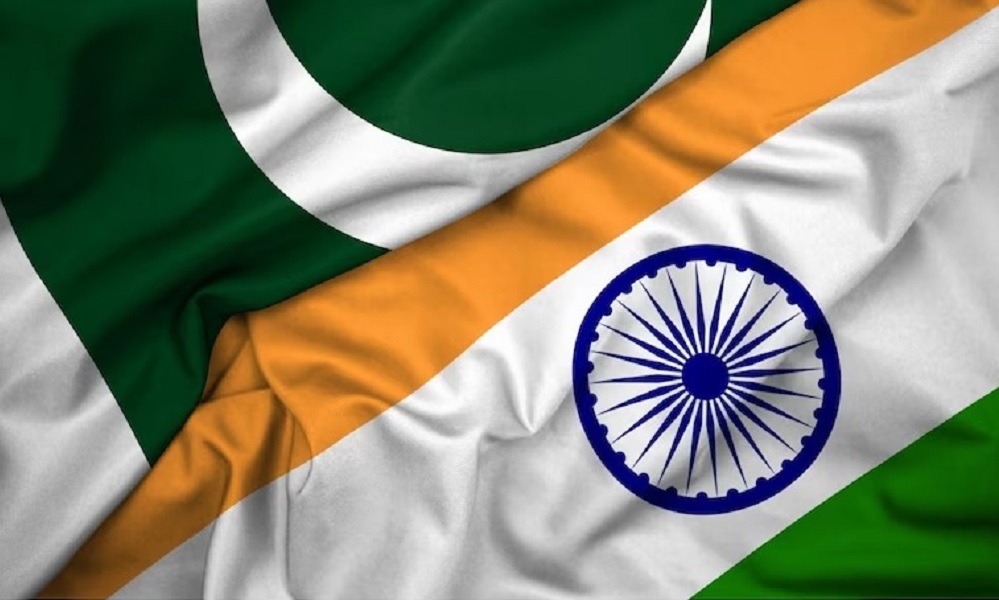
The U.S. government said it offered assistance to make India and Pakistan start “constructive talks” while the Group of Seven (G7) major countries also urged the Asian neighbors to engage in direct dialogue amid heightened hostilities.
World powers have raised the alarm over the latest escalation in the decades-old India-Pakistan rivalry. India hit Pakistan with air strikes and missiles on Wednesday and since then the nuclear-armed countries have been clashing daily while launching strikes against each other’s military installations on Saturday. Dozens have been killed.
The U.S., especially Secretary of State Marco Rubio, has held regular talks with both India and Pakistan since late April and urged them to de-escalate.
The U.S. State Department late on Friday and early Saturday released three statements on Rubio’s calls with Pakistan Army Chief Asim Munir, and the foreign ministers of India and Pakistan.
It said Rubio urged them to “re-establish direct communication to avoid miscalculation” while offering U.S. assistance “in starting constructive talks” to avoid future conflicts.
Michael Kugelman, a Washington-based South Asia analyst and writer for the Foreign Policy magazine, said Rubio’s decision to call the army chief directly was “the most consequential move the U.S. has made” since the start of the crisis:
“If you want to talk to the Pakistanis about de-escalation, you need to talk to General Munir.”
President Donald Trump said earlier this week the rising tensions were a shame. U.S. Vice President JD Vance said a war would be “none of our business.”
In recent years, India has been seen as a partner by Western powers to counter China’s rising influence. Pakistan is a U.S. ally although its importance has diminished since Washington’s 2021 withdrawal from neighboring Afghanistan.
In a G7 statement, the foreign ministers of Canada, France, Germany, Italy, Japan, the U.S., Britain and the European Union said they “strongly condemn” an April 22 Islamist militant attack in which 26 people were killed in India-administered Kashmir. India blamed Pakistan, which denied the accusations and called for a neutral probe.
“We call for immediate de-escalation and encourage both countries to engage in direct dialogue towards a peaceful outcome,” the G7 top diplomats said.
Muslim-majority Kashmir is claimed in full but ruled only in part by both Hindu-majority India and Islamic Pakistan and has seen wars, insurgency and diplomatic stand-offs over the decades.
(Reuters)
World
Macron to meet Syrian president on Wednesday, expected to discuss security
Sharaa in February received an invitation from Macron to visit France.
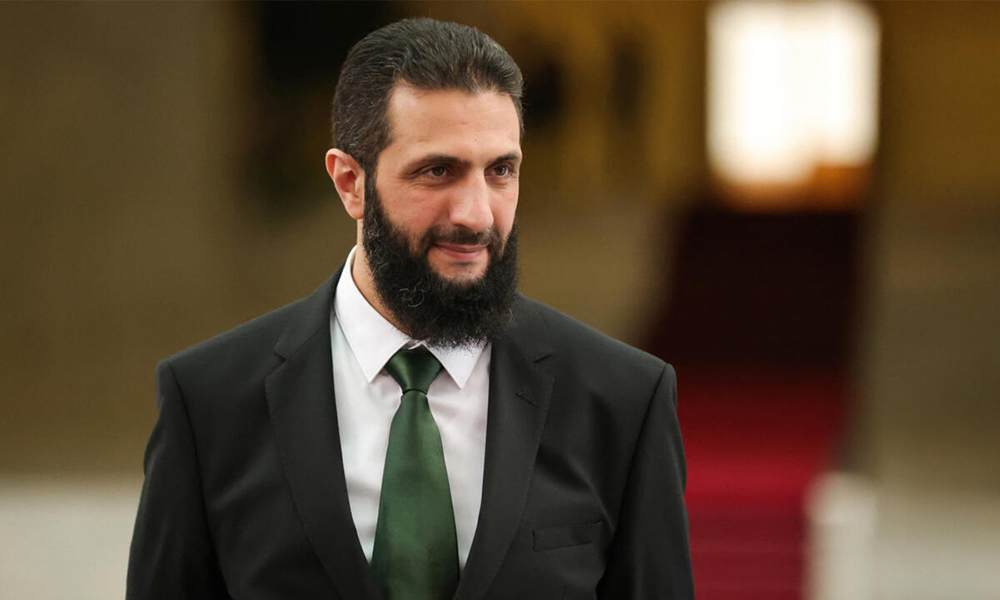
French President Emmanuel Macron will host a meeting with Syria’s President Ahmed al-Sharaa in Paris on Wednesday, the French presidency said on Tuesday.
During the meeting, Macron will reaffirm France’s support for the construction of a “free, stable and sovereign Syria that respects all the components of the Syrian society,” the statement said.
The visit, the first for Sharaa to a European country since the overthrow of Bashar al-Assad, is expected to address several security challenges faced by the new Syrian government, with particular emphasis on the repeated Israeli attacks on Syria’s sovereignty, according to the state-run Syrian news agency SANA.
Sharaa in February received an invitation from Macron to visit France, Reuters reported.
In January, Sharaa was named as interim president and pledged to form an inclusive transitional government that would build up Syria’s gutted public institutions and run the country until elections, which he said could take up to five years to hold.
Israel has escalated military operations in Syria since rebels ousted Assad in December, with bombings across the country and ground forces entering its southwest, while calling for Syria to remain decentralised and isolated, read the report.
It has framed its stance around its suspicion of Sharaa – who once headed a branch of al Qaeda before renouncing ties to the group in 2016 – and a desire to protect the Druze, a minority sect that is an offshoot of Islam with followers in Syria, Lebanon and Israel.
-

 Regional5 days ago
Regional5 days agoIran’s foreign minister urges restraint in India, Pakistan standoff
-

 Latest News5 days ago
Latest News5 days agoCabinet Meeting convened to discuss Afghanistan’s population census plan
-

 International Sports5 days ago
International Sports5 days agoIPL 2025: Seven teams fighting for four spots
-
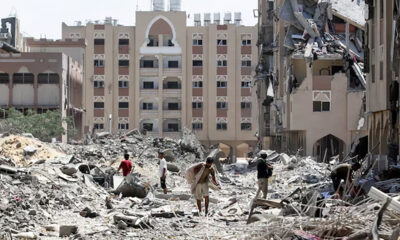
 World5 days ago
World5 days agoIsrael may seize all Gaza in expanded operation, officials say
-

 Regional4 days ago
Regional4 days agoAt least 26 civilians killed in Indian strikes on Pakistan: Islamabad
-
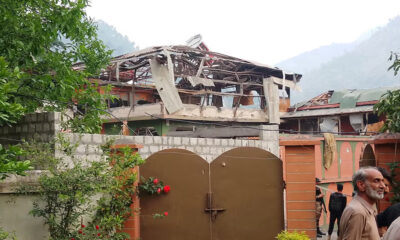
 Regional4 days ago
Regional4 days agoIndia strikes Pakistan over Kashmir tourist killings
-

 Science & Technology4 days ago
Science & Technology4 days agoSkype ends operations after 22 years of service
-

 Latest News4 days ago
Latest News4 days agoIslamic Emirate of Afghanistan ‘concerned’ over rising tensions between Pakistan and India








